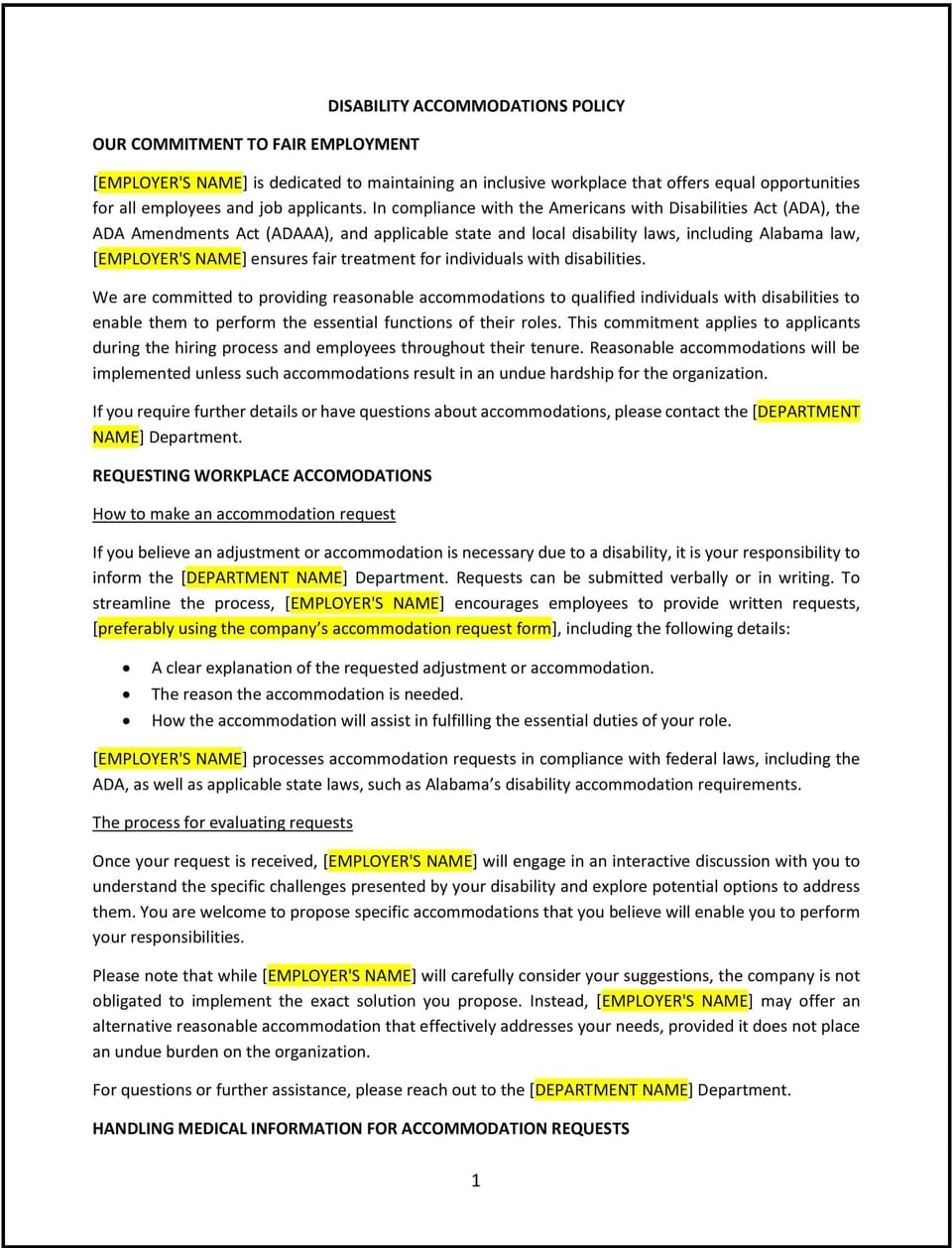Disability accommodations policy (Alabama): Free template

Disability accommodations policy (Alabama)
A disability accommodations policy ensures that employees with disabilities have equal access to opportunities, resources, and work environments. For SMBs in Alabama, this policy is vital to comply with the Americans with Disabilities Act (ADA) and Alabama’s own disability laws. By tailoring this policy to your business needs, you can provide a supportive work environment that accommodates the needs of employees with disabilities, ensuring they can contribute fully to your organization.
This policy promotes inclusivity, reduces discrimination risks, and supports the recruitment and retention of a diverse workforce.
How to use this disability accommodations policy (Alabama)
- Define disability: Clearly explain what constitutes a disability under Alabama and federal law, including both physical and mental impairments.
- Identify accommodation options: List possible accommodations, such as modified work schedules, accessible workspaces, assistive technology, or changes to job duties.
- Outline the request process: Provide a step-by-step process for employees to request accommodations, ensuring that it is straightforward and accessible.
- Ensure confidentiality: Emphasize the importance of maintaining confidentiality during the accommodation process to protect employee privacy.
- Provide a response timeline: Set clear expectations for how long the accommodation process will take to ensure employees know when to expect a response.
Benefits of using a disability accommodations policy (Alabama)
A well-implemented disability accommodations policy helps foster an inclusive and supportive work environment. Here's how it benefits your company:
- Promotes diversity: Ensures that employees with disabilities can perform their job functions and access the same opportunities as others.
- Reduces legal risks: Helps your business comply with the ADA and Alabama’s disability laws, reducing the likelihood of legal disputes or penalties.
- Enhances employee satisfaction: Demonstrates your commitment to supporting all employees, which can improve morale and retention.
- Increases productivity: Provides employees with the tools and resources they need to succeed, resulting in higher job performance.
- Protects your reputation: Positions your business as a fair, inclusive, and responsible employer.
Tips for implementing a disability accommodations policy (Alabama)
- Be proactive: Create an environment where employees feel comfortable requesting accommodations by clearly communicating the policy and process.
- Consider all needs: Recognize that disabilities are not one-size-fits-all, and tailor accommodations to meet the unique needs of each employee.
- Involve relevant departments: Work with HR, management, and any external experts to ensure the accommodations are appropriate and feasible.
- Use flexible solutions: Offer various accommodation options, such as adjustable workstations, flexible hours, or telecommuting, to accommodate different disabilities.
- Review and update regularly: As your workforce changes, continuously assess and update the policy to reflect new challenges or legal requirements.
Q: What is considered a disability under the ADA in Alabama?
A: A disability is defined as a physical or mental impairment that substantially limits one or more major life activities, such as walking, talking, or working.
Q: How do employees request accommodations?
A: Employees should inform their manager or HR about their disability and the accommodations they need. This can be done in writing or verbally, and requests will be handled confidentially.
Q: Can employees request accommodations for mental health conditions?
A: Yes, mental health conditions, such as anxiety or depression, can qualify for accommodations if they substantially limit major life activities.
Q: What happens if an accommodation request is denied?
A: If an accommodation request is denied, employees can work with HR to explore other options or file a formal grievance if they believe discrimination occurred.
Q: Are there any exceptions to providing accommodations in Alabama?
A: Employers are not required to provide accommodations that would create an undue hardship on the business. This includes accommodations that would significantly disrupt operations or require unreasonable financial expenditure.
Q: How do accommodations benefit the workplace?
A: Providing accommodations allows employees to contribute fully to the workforce, enhancing diversity and increasing overall productivity while reducing turnover and absenteeism.
This article contains general legal information and does not contain legal advice. Cobrief is not a law firm or a substitute for an attorney or law firm. The law is complex and changes often. For legal advice, please ask a lawyer.


